Saturday school; effective punishment or convenient solution?
November 1, 2017
Saturday school is for students who have broken rules, have low grades, or done something morally wrong. They come to school on Saturday between 8 a.m. and 11 a.m. to sit in a classroom with other students and do homework. At the beginning of the year, teachers volunteer for dates to watch students. Every week there is a different teacher. Many teachers have been doing Saturday school for years.
Kristi Miller, an English teacher, volunteered four times for the fall period, and two for spring period. Miller began doing Saturday school when she started teaching at Johnston eight years ago. Miller tends to let people into school at 7:45 a.m. so they are able to get to the classroom in time. There have been days where Miller went to the school, only for no students to show up.
Despite the setbacks, Miller enjoys doing Saturday school. Since Miller doesn’t have to pay close attention to what they are doing, she has time to work. She also enjoys that she can get things done, since her six-year-old wants all of her attention while she’s at home. “It gives me uninterrupted work time,” Miller said. “They’re supposed to be working on school related stuff, but they just have to stay awake and they have to stay quiet.”
Miller is not able to say what exactly people are doing during the time. It is rare for there to be a kid from Miller’s class when she is in charge of the class. “I don’t watch them to see that they’re doing what they’re supposed to be doing,” She said, “I don’t know their homework assignments.”
Jennifer Palmer, the STAR study teacher, has been doing Saturday school two or three times a year for seven years. “It gives me a chance to get to know kids that are there,” she said.

Jennifer Palmer, teacher of Star Study, does Saturday school each year. The majority of the time, students are quietly working during the three hours.
Saturday school is meant to be a quiet time for students, and individual teachers are able to decide what they will have for rules. The rules set by associate principal Jerry Stratton are no sleeping, no eating and students should be working. Palmer allows students to be talking about classes they share, as long as it stays school related.
Conner Sisler ’19 has been in Saturday school twice. One time a Twitter account started as a joke and went out of proportion, ending up as a hate page before Sisler could regain control. He got in trouble with administration and ended up in Miller’s class.
For one of his times, the supervisor played “Toy Story” for the entire time as he watched. With the other teacher, Sisler played games on his iPad after he finished his homework. “I wasn’t just going to sit there, and I can’t just sleep at school,” he said.
Many of the students in his class were complaining about how slow the day was going and would shout at the teacher saying they wanted to leave. Students who do not go to Saturday school will be suspended after multiple reminders.
Psychology teacher Jesse Dowell is currently having his AP Psychology students learn about school policies and how effective they are. One of these policies is Saturday school.
“The goal [of Saturday school] is to add a punishment so students avoid undesired behaviors,” Dowell said. He believes that having students sit for three hours without any certain direction will leave them to distractions from any work they were supposed to do.
Dowell believes that punishments would be more effective if they were meant to do something task-oriented. Because Dowell is not their teacher, he is not able to make them focus on their specific assignments. “When I was in school, we did detentions,” he said. Detention has the advantage of being with a specific teacher as opposed to one that volunteered for that week.
Dowell does not know what method would be most effective to convince students to behave properly. “We use [Saturday school] because we don’t know what else to use.”





